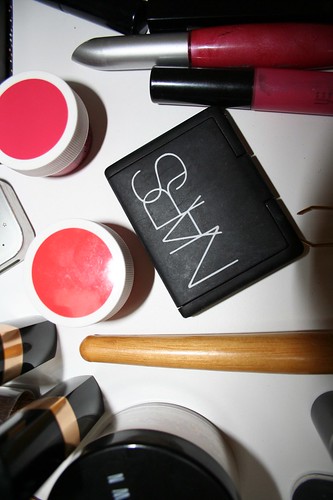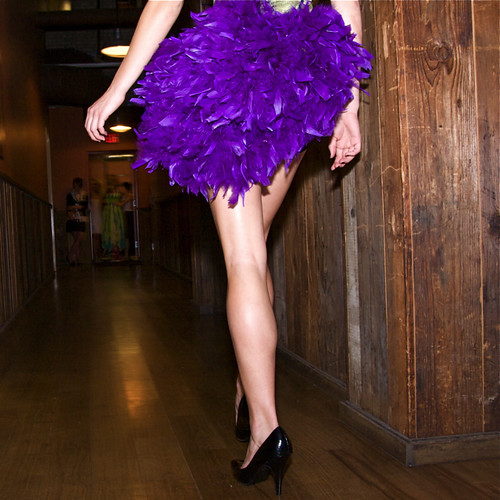Consequently, I choose to address it because the conversation was pointedly nasty, gendered, and misogynistic and embodies what all girls and women in our culture, to a greater or lesser degree, endure every day, in ways both outrageous and subtle.Later on, she uses this platform as a way to express disappointment with women's needs to tear each other down and to call for solidarity:
That women are joining in the ongoing disassembling of my appearance is salient. Patriarchy is not men. Patriarchy is a system in which both women and men participate. . . It is subtle, insidious, and never more dangerous than when women passionately deny that they themselves are engaging in it.And
I ask especially how we can leverage strong female-to-female alliances to confront and change that there is no winning here as women.I found her piece refreshing and echoing many of the same sentiments about the frustration of watching women tear each other apart that I've felt time and time again. I--along with many of the feminist writers I read--was happy to share her words with friends.
But some are less pleased with Judd's alignment of herself as a feminist spokesperson. Clarissa, over at Clarrisa's Blog, has a response to Judd that is pretty harsh. (I read Clarissa's writing somewhat regularly, and I enjoy seeing her perspectives even when I don't completely agree with them, so I'm not just bringing this up to bash her point of view. Instead, I'm hoping to explore it a little).
Clarissa claims Judd is a "Hollywood starlet" who "used to be completely fine with Hollywood objectification to which she contributed as much as she could by offering her photoshopped appearance to the world on every occasion that presented itself." She claims that Judd is being a hypocrite by now maligning the very system from which she previously profited.
Clarissa then goes on to say "What I find especially entertaining is that many pseudo-feminists have started jumping on Judd's wagon, promoting her as some kind of feminist."
Hey! That's me! I shared Judd's article on Facebook. I linked to it in this post where I talked about Samantha Brick and female competition. I believe that Judd made a feminist statement, and I have no reason to doubt Judd's beliefs in those statements. I don't personally know Judd or her internal thoughts, but I tend to take people at their word until they've done something to prove otherwise.
Others have pointed out that this is not Judd's first time publicly identifying herself as a feminist or promoting feminist ideas, but that's not what interests me the most about Clarissa's claims.
What I find so interesting is the implication that someone cannot be a real feminist and have previously benefited from the patriarchal system. I find this so interesting because--if the requirement for feminist membership is having never participated in the patriarchy--who's left?
I responded on Clarissa's blog, but I want to examine it a little more here, so this response is taken from my comment there.
Can Previous Participants in Patriarchal Systems Be Feminist?
 |
| From kh1234567890 |
Sure, Judd (and many other women, famous or not) may have changed her tune from when she was a 20-something or even a 30-something able to package and sell the "beautiful" product of her body to society, but just because she was participating in that system doesn't mean she was advocating it. Hardly any woman (or man) I know was born recognizing patriarchy. It takes years of experience, conversations with others, and analysis to gain that understanding--a feat that seems to happen more and more to women when they hit some sort of barrier that finally makes them take a look around.
For Judd, maybe that barrier was her age and getting maliciously hounded by the media that used to adore her for her puffy face and weight gain. For me, that barrier was pregnancy and recognizing that the "equality" for men and women message I'd been getting my whole life wasn't really manifested in many actual, lived experiences. There are lots of ways to come face-to-face with a system of oppression and suddenly recognize all the ways you've been complicit within it. It is guilt-inducing and overwhelming, especially when it also comes with recognizing some of your own privileges (size privilege, age privilege, race privilege, and ability privilege probably top among them in this context).
I don't think this makes the person at the receiving end of these revelations a hypocrite any more than I would look at one of my students' previous papers and tell them they are hypocrites for now properly using the grammar rules I've taught them that they didn't before. That's not hypocrisy; that's progress.
Are There Work Spaces Free From Judgment?
 |
| From kelpenhagen |
Unlike in Judd’s job, in my profession nobody gives a rat’s ass about my celestial beauty. I can have the most perfect face and the most statuesque figure in the world but if I arrive at my yearly review with no publications, no service activities and lousy student evaluations, my contract will simply not be renewed. I’m not objectified at work and my personhood and accomplishments are not dismissed for the simple reason that I’m selling the products of my intellectual labor. If Judd chooses to sell pictures of a cute ass, it is hardly a huge feminist issue that the product she sells has an expiration date.I'm--of course--not trying to refute Clarissa's claim that she's "not objectified at work," and I sincerely hope that's true. But I don't think that it's true that all women who are "selling the products of [their] intellectual labor" are free from objectification in the work place.
After all, there are studies that suggest women who wear make-up are perceived as more competent, there are pay discrepancies based on body size (full study here), and a host of pressures based on appearance and objectification manifest themselves in ways subtle and overt in the lives of many women, even if their profession is not necessarily tied to their bodies. More evidence of these kinds of lived experiences with objectification appear as women--inspired by Judd's "puffy face" piece--have taken to Twitter to share their #puffyfacemoment with the world.
Women are telling about everything from a hairdresser's comments that she's "too pretty to be Jewish" to uncles telling them it's time to lose pregnancy weight two weeks after a c-section.
Maybe some women don't feel a connection to Judd's workplace objectification, but many do. And I don't think that's limited only to women whose jobs are directly linked to their appearance.
My Patriarchal Bargain is Better than Your Patriarchal Bargain!
 |
| From stevendepolo |
We like to draw lines in the sand. We like to say that this is "too much" this is "too far." We like to make boundaries around what is an acceptable amount of patriarchal bargain for a feminist. Can a feminist make pornography? Can a feminist dance burlesque? Can a feminist get breast implants? Can a feminist listen to songs with misogynistic lyrics? Can a feminist watch movies where a woman is a victim of violence? Can a feminist dye her hair? Can a feminist wear perfume? Can a feminist get married? Can a feminist buy products advertised with sexist campaigns? Can a feminist shave her legs? Can a feminist wear a mini skirt?
In some ways, all of those things are patriarchal bargains. The basis for the allure of a mini skirt or hairless legs or dyed hair, etc. are wrapped up in patriarchy. Our pop culture and advertisements are saturated with misogynistic themes. Most of us make patriarchal bargains every day.
But we tend to draw boundaries around our own comfort zone and use them in definitional ways. While, yes, any term (including "feminist") has to have some boundaries in order for it to have meaning, I think we need to take a step back and make sure that we aren't just arbitrarily putting our own preferences and comfort levels onto something that's actually bigger than us.
And that's what I thought of when Clarissa called me and the other women who shared Judd's piece with excitement "pseudo-feminists."
Be careful. There's not much opportunity for collaboration at a table for one.

Thanks for a great post, Balancing Jane. I read Clarissa's post as well and left feeling like no one could win this game and that feminism was now a "be perfect just like me or get out" clique. Since my post on boudoir photography and reading yours on burlesque, I've thought a lot more on how I in the day-to-day succumb to patriarchal bargains (makeup, hair, fashion, priorities, time, relationships, etc.). It's also been quite difficult to uncover these bargains in the context of Christian community, too, because it so depends on patriarchy.
ReplyDeleteExactly! When I read the post (and others like it--I'm really not trying to single out Clarissa), I felt frustrated. I know I can't be the "perfect feminist," but I truly don't think any of us are. We are products of a patriarchal structure and have to continue operating within one even as we attempt to dismantle it. This is especially true when feminism is not the only (or even the primary) part of our identities (as you mention with Christianity). Being a feminist is a huge part of who I am, but it's not the only part, and that means that sometimes my decisions are informed by other considerations as well.
DeleteThe first line of Clarissa's post is teeming with evidence of the issues Judd was discussing. Clarissa states that as a Hollywood actress her [Judd's] only job was to look pretty. Well then. I imagine a large number of actresses would be highly offended at the notion their work is akin to a stage prop.
ReplyDeleteSince Clarissa, and I'm assuming others, have a belief that a female actor's work is solely defined in their ability to look pretty, it's no wonder she finds Judd's piece hypocritical. I'd say Clarissa needs to open her eyes a bit.